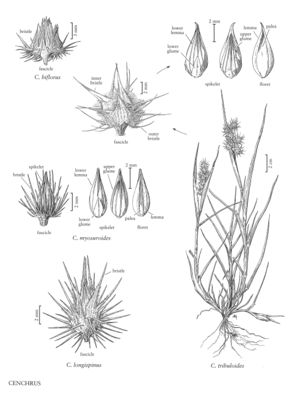Difference between revisions of "Cenchrus longispinus"
FNA>Volume Importer |
FNA>Volume Importer |
||
| Line 7: | Line 7: | ||
|synonyms={{Treatment/ID/Synonym | |synonyms={{Treatment/ID/Synonym | ||
|name=Cenchrus carolinianus | |name=Cenchrus carolinianus | ||
| − | |authority= | + | |authority= |
| + | |rank=species | ||
}} | }} | ||
|hierarchy=Poaceae;Poaceae subfam. Panicoideae;Poaceae tribe Paniceae;Cenchrus;Cenchrus longispinus | |hierarchy=Poaceae;Poaceae subfam. Panicoideae;Poaceae tribe Paniceae;Cenchrus;Cenchrus longispinus | ||
| Line 20: | Line 21: | ||
-->{{Treatment/Body | -->{{Treatment/Body | ||
|distribution=Conn.;N.J.;N.Y.;Wash.;Del.;D.C;Wis.;W.Va.;Mass.;Maine;N.H.;R.I.;Vt.;Wyo.;N.Mex.;Tex.;La.;Tenn.;Ariz.;Fla.;Ohio;Pa.;Nev.;Va.;Colo.;Calif.;Ala.;Kans.;N.Dak.;Nebr.;Okla.;S.Dak.;Oreg.;Ark.;Ill.;Ga.;Ind.;Iowa;Md.;Utah;Mo.;Minn.;Mich.;Mont.;Miss.;B.C.;Ont.;Que.;Ky.;N.C.;S.C. | |distribution=Conn.;N.J.;N.Y.;Wash.;Del.;D.C;Wis.;W.Va.;Mass.;Maine;N.H.;R.I.;Vt.;Wyo.;N.Mex.;Tex.;La.;Tenn.;Ariz.;Fla.;Ohio;Pa.;Nev.;Va.;Colo.;Calif.;Ala.;Kans.;N.Dak.;Nebr.;Okla.;S.Dak.;Oreg.;Ark.;Ill.;Ga.;Ind.;Iowa;Md.;Utah;Mo.;Minn.;Mich.;Mont.;Miss.;B.C.;Ont.;Que.;Ky.;N.C.;S.C. | ||
| − | |discussion=<p>Cenchrus longispinus grows in sandy woods, fields, and waste ground in southern Canada and the contiguous United States. Its range extends southwards to Venezuela. It is often confused with C. spinifex and C. tribuloides; see discussion under those species.</p> | + | |discussion=<p><i>Cenchrus longispinus</i> grows in sandy woods, fields, and waste ground in southern Canada and the contiguous United States. Its range extends southwards to Venezuela. It is often confused with <i>C. spinifex</i> and <i>C. tribuloides</i>; see discussion under those species.</p> |
|tables= | |tables= | ||
|references= | |references= | ||
| Line 29: | Line 30: | ||
-->{{#Taxon: | -->{{#Taxon: | ||
name=Cenchrus longispinus | name=Cenchrus longispinus | ||
| − | |||
|authority=(Hack.) Fernald | |authority=(Hack.) Fernald | ||
|rank=species | |rank=species | ||
| Line 36: | Line 36: | ||
|basionyms= | |basionyms= | ||
|family=Poaceae | |family=Poaceae | ||
| − | |illustrator=Linda A. Vorobik | + | |illustrator=Linda A. Vorobik;Annaliese Miller |
| + | |illustration copyright=Utah State University | ||
|distribution=Conn.;N.J.;N.Y.;Wash.;Del.;D.C;Wis.;W.Va.;Mass.;Maine;N.H.;R.I.;Vt.;Wyo.;N.Mex.;Tex.;La.;Tenn.;Ariz.;Fla.;Ohio;Pa.;Nev.;Va.;Colo.;Calif.;Ala.;Kans.;N.Dak.;Nebr.;Okla.;S.Dak.;Oreg.;Ark.;Ill.;Ga.;Ind.;Iowa;Md.;Utah;Mo.;Minn.;Mich.;Mont.;Miss.;B.C.;Ont.;Que.;Ky.;N.C.;S.C. | |distribution=Conn.;N.J.;N.Y.;Wash.;Del.;D.C;Wis.;W.Va.;Mass.;Maine;N.H.;R.I.;Vt.;Wyo.;N.Mex.;Tex.;La.;Tenn.;Ariz.;Fla.;Ohio;Pa.;Nev.;Va.;Colo.;Calif.;Ala.;Kans.;N.Dak.;Nebr.;Okla.;S.Dak.;Oreg.;Ark.;Ill.;Ga.;Ind.;Iowa;Md.;Utah;Mo.;Minn.;Mich.;Mont.;Miss.;B.C.;Ont.;Que.;Ky.;N.C.;S.C. | ||
|reference=None | |reference=None | ||
| Line 42: | Line 43: | ||
|publication year= | |publication year= | ||
|special status= | |special status= | ||
| − | |source xml=https:// | + | |source xml=https://jpend@bitbucket.org/aafc-mbb/fna-data-curation.git/src/f50eec43f223ca0e34566be0b046453a0960e173/coarse_grained_fna_xml/V25/V25_1377.xml |
|subfamily=Poaceae subfam. Panicoideae | |subfamily=Poaceae subfam. Panicoideae | ||
|tribe=Poaceae tribe Paniceae | |tribe=Poaceae tribe Paniceae | ||
Revision as of 21:33, 16 December 2019
Plants annual; tufted. Culms 20-90 cm, sometimes decumbent, often with many branches arising from the base. Sheaths strongly compressed-keeled; ligules 0.6-1.8 mm; blades 4-27 cm long, 1.5-5(7.5) mm wide, adaxial surfaces scabrous or sparsely pilose. Panicles 1.5-8(10) cm; fascicles 8.3-11.9 mm long, 3.5-6 mm wide, somewhat globose, medium- to short-pubescent; bristles 45-75; outer bristles numerous, shorter and thinner than the inner bristles, imbricate, mostly terete, reflexed; inner bristles 3.5-7 mm long, 0.5-0.9(1.4) mm wide at the base, irregularly placed, fused for 1/2 their length or more, forming a distinct cupule, the distal portions diverging at irregular intervals from the cupule, often grooved along the margins, purple-tinged. Spikelets 2-3(4) per fascicle, (4)5.8-7.8 mm. Lower glumes 0.8-3 mm; upper glumes 4-6 mm, 3-5-veined; lower florets often staminate; lower lemmas 4-6.5 mm, 3-7-veined; anthers 1.5-2 mm; upper lemmas 4-7(7.6) mm; anthers 0.7-1 mm, seemingly not well-developed at anthesis. Caryopses 2-3.8 mm long, 1.5-2.6 mm wide, ovoid. 2n = 34 (38).
Distribution
Conn., N.J., N.Y., Wash., Del., D.C, Wis., W.Va., Mass., Maine, N.H., R.I., Vt., Wyo., N.Mex., Tex., La., Tenn., Ariz., Fla., Ohio, Pa., Nev., Va., Colo., Calif., Ala., Kans., N.Dak., Nebr., Okla., S.Dak., Oreg., Ark., Ill., Ga., Ind., Iowa, Md., Utah, Mo., Minn., Mich., Mont., Miss., B.C., Ont., Que., Ky., N.C., S.C.
Discussion
Cenchrus longispinus grows in sandy woods, fields, and waste ground in southern Canada and the contiguous United States. Its range extends southwards to Venezuela. It is often confused with C. spinifex and C. tribuloides; see discussion under those species.
Selected References
None.
